|
Late August evening, Suga and his four friends gathered together at the
beer garden on the 3rd floor of Josui-kaikan Hall. His friends this time
were Ryohei Tsubune, Eriko Fukami, Mutsumi Iwaida and Midori Yamabe. They
intend to discuss "the Auditorium Where Monsters Live."
It is not dark and still hot, but soft wind strokes their cheeks comfortably.
There are few people there and no barbecue party of the garden's pride
yet on any table.
There is a low-keyed bronze statue at the corner. It is Mercury made by
Giambologna of Italy in 1580, which was put here in 1982 from National
Bargello Museum in Florence, Italy, when Suga was Manager of Josui-kai
(the alumni meeting of the school).
|
| The bulletin board says, |
|
"Mercury, business god, comes from Greek mythology. Its helmet and
the small stick with a wing on top show the quick transmission of information
on air. The stick around which two snakes, male and female, winding shows
the reconciliation of fruitless conflicts.
Around 1887, the top part of Mercury's stick was enacted as the school badge of Tokyo Commercial School (presently Hitotsubashi University). |
|
Thanks to the information from Mutsumi and Midori, Suga's head has been
arranged a little. So, this is their first meeting to share their present
knowledge and decide the way to proceed from now. Suga and Eriko came faraway
from Ofuna, Kamakura City.
Mutsumi seems to have attended some event in the hall, so she wears a party
dress on a slight body with thick lipstick. Who can imagine she has three
children?
"Sorry for such kind of clothes," says she in her excuse.
Midori, plump a little and slightly made up with usual tortoise shell glasses,
is carrying a big shoulder bag. She exchanges greetings with Tsubune, a
business partner.
Two of the junior ladies meet Eriko for the first time, but know quite
well that she is a popular painter and is Suga's intimate friend.
They pleasantly greeted her.
Five of them, with a beer mug in hand, talk about nothing in particular
for a while. When they get to a good place to leave off, Tsubune leads
to the main subject, saying "Well ..."
The starter is the school history, which goes back to the early days at
the beginning of Meiji era.
"It was more than 40 years before my birth ..."
Elderly Suga begins to talk in a usual comic-story telling way.
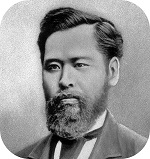 |
| Arinori Mori |
"The school came into being in Meiji 8 (1875) at Ginza-Owari town
in Tokyo as a private school "Commercial Law Institute" of Arinori
Mori. Next year (2005) is the 130th anniversary."
Tsubune cuts in a little cautiously.
"It is also 30 years since our senior Mr. Suga was involved in the
collection of compositions celebrating the 100th anniversary."
He took over most of the collection from Suga before and keeps them on
the brand-new bookshelf named "Suga Library." The collection
consists of more than 30 books of big volume.

Since its birth the name of the school was changed from Commercial Law
Institute to Tokyo Commercial School (TCS), High Commercial School and
to Tokyo High Commercial School within 30 years.
"I'd like to talk about a certain happening during those days a little."
Suga says, and Midori opens a notebook and prepares for memo-writing.
"When it was Tokyo Commercial School (TCS), it had to merge with Tokyo
School of Foreign Languages (TFL, presently Tokyo University of Foreign
Studies) in Meiji 18 (1885) by the force of the Ministry of Education.
The partner is still not satisfied yet."
As Tsubune has ever heard about this story from Suga, he is enjoying the
curious eyes of the ladies. Suga continues.
"Following the merger, the partner's school building at Kanda-Hitotsubashi
street was used as a main building. But when they were divided back to
the previous style again after a dozen years, the main building and the
site originally of the partner came to belong to Tokyo Commercial School
(TCS), and the partner (TFL) was forced to move to Kanda-Nishiki town."
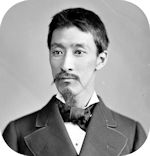 |
| Jiro Yano |
"Concerning the merger itself too, our school actually absorbed the
partner, because "Tokyo Commercial School" was carried on as
the new school name, and Jiro Yano of our school assumed a new principal
post. Isn't it reasonable that they lament their misery saying 'Give knaves
an inch and they will take a yard'."
"In spite of such an awkward trouble those days,"
Suga adds the relationship between them afterward.
Our school, especially since promoted to Hitotsubashi University in 1949,
has had close relations with Tokyo University of Foreign Studies, such
as interaction of professors, circle activities of students, etc.
In recent years, their relationship has deepened much more. In Heisei 13
(2001), they formed the union of the four universities with Tokyo Medical
and Dental University and Tokyo Industrial University, which started the
collaborate education project, and it is active now.
Anyway, the starting point of the university name "Hitotsubashi"
is this place where the two schools merged together for a while.
|
Eriko says, smiling, her niece Mari Nomizo graduated from Tokyo University
of Foreign Studies and also she is making good use of her carrier of foreign
languages and knowledge mastered at the university. Tsubune may recall
the bitter memory of failing in its entrance examination.
Eriko's short chat has brought out some talk related to the university
Mari graduated from for a little while.
Suga seems to remember one story at the time of merging in Meiji 18 (1885).
He says,
"The by-product then was the boat club."
"What ever is it?"
Mutsumi Iwaida gives him a puzzled look. Her eye shadow is bright.
"The assets of both schools were shared on account of the merger,
which included a cutter of TFL. It was a large sailing boat, leading to
the birth of the boat club at TCS, floating on Sumida River.
Next is the story of their school uniform and cap.
"These were also decided at the time," saying it, Suga is following
the document and holding back his laughter.
"At any festivals before that time, TCS was 'traditional merchant style in haori and hakama (formal male Japanese kimono)', and TFL was 'masterless samurai style in broken hakama carelessly dressed in an affected way'."
Eriko promptly cuts into it in a dubious look. Her dimples are clear.
"The merchant style of TSC is imaginable all right, but the style
of TFL is funny, though it would be OK if in a style of a jacket with a
bow tie."
Elderly Suga gives a slight smile to Eriko and slaps his knee. He seems
to flash the Japan dormitory song festival held every year in the fall.
He says,
"Both funny styles appear in the festival now too. I wear old merchant
clothes, but envy the vulgar tradition."
And adding,
"When the two universities merged together, those styles were discontinued
by the notice from the Ministry of Education, and they were requested to
wear Western clothes and a cap with Mercury badge instead. It was a story
of 120 years ago in the days of cultural enlightenment."
Suga quenched his thirst with a mug, seeming to have enjoyed wondering
off.
His talk enters the Taisho period. It's the story of the way to the construction
of Kanematsu Auditorium after the promotion to college and the disaster
by Great Kanto Earthquake.
"It was 45 years after the foundation when it was promoted to college.
Until then it had a hard time of the long bitter tears and strenuous efforts
as Mr. Kawaji mentions in his paper and had to have fought against the
Ministry of Education clinging to the former Imperial universities and
high schools."
Tsubube looks down for the senior's expression of something biased. Guessing
it, Suga stops this story, saying, "I would like further to talk about
it later sometime."
Mutsumi crosses her legs leaning forward, caring the party dress. A scent
of perfume tickles Tsubune's nose.
Suga moves the story forward.
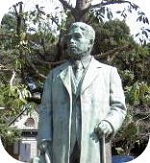 "Our school was promoted from Tokyo High Commercial to Tokyo Commercial
College (TCC) in Taisho 9 (1920), and Zensaku Sano was appointed to the
first president. He had been with this old school from the start. All the
former principals of the old school were parachuting of a government official." "Our school was promoted from Tokyo High Commercial to Tokyo Commercial
College (TCC) in Taisho 9 (1920), and Zensaku Sano was appointed to the
first president. He had been with this old school from the start. All the
former principals of the old school were parachuting of a government official."
Saying it, Suga shows them the list of the former principals. Since the
2nd principal Jiro Yano had left, the parachuting lasted for 8 times.
"During his term the Great Kanto Earthquake struck the Kanto and surrounding areas. In the result, all the buildings in TCC's Kanda Campus were destroyed. Making use of the misfortune to the contrary, he, as the top of the restoration committee, decided to move the campus to Musashino Wilderness, by making a school town in Yaho village and developing the Kunitachi Campus....."
" What about each explanation?", Eriko makes an interjection.
Suga continues the story, saying "May I follow it for a little while?"
"In Showa 10 (1935), four years after every project related to the
campus move ended, the blank-ballot incident came up."
Apart from Eriko, not an alumnus, the three juniors react slow. Knowing
it, Suga, the senior, puts it briefly saying "I may talk about this
school disturbance in detail before long ..."
Letting well enough alone with the school from the start, president Sano
had been in the position for 21 years in Showa 10 (1935).
This year, in the examination of the doctoral dissertation, Sano regarded
the thesis of the innovative associate professor as a problematic work,
and made the judges of his hangers-on cast a blank ballot, and eliminated
him.
This became a firebrand to the student movement, which got out of hand
and drove Sano to resign. |
Suga himself entered the college the next year, so he probably has a vivid
memory. But he finishes it leaving too short for now.
It is getting dark. The parasols on the tables are not necessary anymore. The polka-dot covers become silhouettes in the air space. A breeze rubs away gently.
"It is because of this incident that president Sano doesn't appear
often, isn't it?"
Mutsumi speaks with a knowing look.
Nodding her, Suga with something in mind takes out the document received
from her the other day.
"Now, Dr. Shinshichi Miura, our Kawaji refers to in this paper."
Four of them have been expecting this stage.
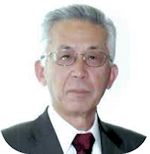 Miura became the president following Sano. He had resigned a professor
in Showa 2 (1927) when Kanematsu Auditorium was about to be completed,
and had returned to his hometown Yamagata city, Northern Japan. So he,
getting back again, is just like a second marriage with the same woman. Miura became the president following Sano. He had resigned a professor
in Showa 2 (1927) when Kanematsu Auditorium was about to be completed,
and had returned to his hometown Yamagata city, Northern Japan. So he,
getting back again, is just like a second marriage with the same woman.
The reason he returned home is said that the Yamagata Bank, the management
of which his father had been involved in, was just going bankrupt, and
he was eagerly asked to put it back on track.
He succeeded in the reconstruction in the result of his best power, and
afterward he was the president of the bank.
Nontheless, in Showa 10 (1935), he was suddenly begged by the college to
come back and take over its president following the resigned Sano.
He accepted it unwillingly and tried to settle the aftereffects of the
blank-ballot incident. |
Suga talks at a stretch.
The lights has been turned on and the garden gets closed up immediately.
The round tables are now fairly filled.
| Mr. Miura is also with Tokyo High Commercial (THC) from the start and four
years younger than Sano. After graduation he studied in Germany for nine
years, where his main purpose was to study commerce but in addition he
devoted himself to study European civilization history. After coming back,
he was in charge of "European Economic and Civilized History"
at the alma mater as a professor. He taught there for about fifteen years
until returning to Yamagata city for trying to put back the Yamagata Bank
on track. |
Now about time for the link to Shishin (Four-God) statue. The juniors are serious disregarding the breeze. The senior is alive in talking.
"Since Mr. Miura was familiar with the medieval culture in Europe,
I tried to connect him to Chuta Itoh. As Mr. Kawaji mentions in his paper,
both of them are from Yamagata Prefecture too. If it would have been he
himself that had suggested to build Kanematsu Auditorium in Romanesque
style and to fix the Four-God relieves on the upper-center of the facade,
it would have made sense, wouldn't it?"
Mutsumi looks satisfied because she introduced Keizo Kawaji's article.
But elderly Suga shifts the focus to and fro, whether it is his habit to
detour or he is playing innocent.
|
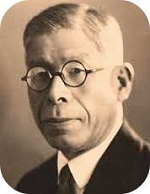
Dr. Ueda |
"Mr. Miura remained the president for only a year. As soon as he managed
to settle the blank-ballot incident, he left the position to Mr. Teijiro
Ueda (nicknamed as Mr. Uetei).
At first he had truly declared that he took on the president as a firefighter
all right, but wasn't the period too short in fact?"
The elderly is fussy in talking here.
"Though Mr. Miura remained a teacher as a professor emeritus afterward,
....."
Suga refers to his own memory, staying on the side road.
"We learned 'Civilization History' under Dr. Miura in a regular course.
He was a gentleman with silver hair, and was strict and sincere.
His taste of a cigar was famous. He was often taking a puff during a break.
He gets out to a corridor or a square, and then takes a piece of Havana
out of the case, lights it with a match and puffs on it. He looks lovingly
at the curling-up smoke's whereabout for a while. His motion during the
time is great. But even so, he smokes it only a little and unexpectedly
throws away the rest to the ashtray.
Once he noticed our longing look and, to my surprise, told me 'You may
smoke, if you please.' I was in heaven. Imitating the way Mr. Miura puffs,
we passed a cigar around. But actually we only puffed being choked with
smoke."
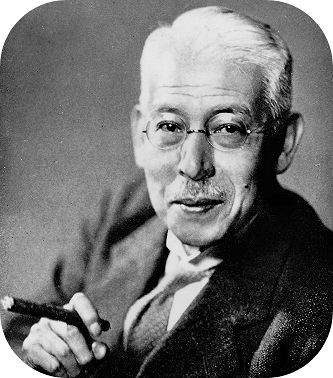
The breeze strokes Tsubune's cheek with a smell like fragrance of roses.
Those present are quietly listening to the senior, but they are waiting
for a more in-depth talk inside.
Noticing it or not, he reveals his true motive.
"I am sorry I haven't found anything to back up the contact of Mr.
Miura with Dr. Itoh ....., though I have checked the literature and documents
in mind as many as possible."
He lets his true feelings, when Mutsumi insists her opinion with no smile.
"Mr. Kawaji strongly claims their relationship. It is persuasive enough.
He visited the possible places in Yamagata prefecture to have investigation."
"And, did he reach any positive proof?"
For this Suga's inquiry Mutsumi is weak. She becomes dull and blinks her
eyes.
"Me too. I want to agree to his idea just like you, but ....."
Suga doesn't look well, not to have his decisive factor either.
"Therefore if we would connect them in this situation, it would be
a daydream of self-satisfaction."
Tsubune says in an incoherent way.
"Mr. Kawaji's opinion is persuasive enough even with a little evidence,
and there is no sure claim to disprove yet for now, is there? I think no
more satisfactory evidence will appear in the future ..."
Suga begins to express his belief, shaking his head to Tsubune.
"I'd like to avoid such simplistic thinking as to lead the facts to
a convenient theory. Besides, not saying the claim to disprove, I am concerned
about the discord between president Sano and Mr. Miura. Therefore during
the days of president Sano, Mr. Miura does not seem to have been valued
according to his ability, though he was a member of the campus restoration
committee after the Great Kanto Earthquake anyway. I rather suppose there
was also something delicate related to their such situation on the background
that Mr. Miura went back to Yamagata in spring of Showa 2 (1927) just before
the completion of the auditorium."
|